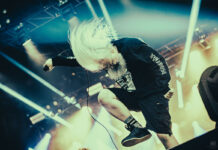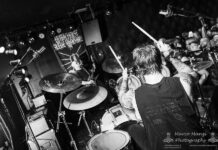A few months after the release of SEVENTH WONDER’s latest album, “The Testament,” we managed to get in touch with Andreas Blomqvist and ask him some burning questions we had about the band, the album, human emotions, and so much more. Read the full interview below:

Hello! First off, how are you doing these days?
Doing good! Very busy practicing to get ready to play live again. It’s been 3 years and some of the songs we are playing have never been played before and others not for like 8 years.
“The Testament” came out on June 10th. How excited are you still about this new album?
Very excited. It is always a tremendous amount of work going into making a record, especially with our type of music. It is funny too because you never really know what it’s going to sound like until it’s out there and you’ve had the chance to listen to it a couple of times. It may sound weird to others not in a band, but we really had no idea what this album was going to sound like, especially since so much of the work happened through sending files rather than playing together.
From a listener standpoint, this is an easier record to digest, especially when compared to “Tiara.” Is it really a simpler record, or did you simplify some of the creative processes?
Well, the word “simple” is tricky as it can mean different things to different people. Listening to it now, I can see your point, it does somehow sound more straightforward and maybe more accessible. The funny thing is I can’t tell you why or how. The only thing I can tell you is that it was not intentional. Sure, coming off of a concept album, there is a certain desire to write a song and just let it speak for itself rather than being a piece of the whole, you know?
When you start working on material, do you start from scratch or do you bring in ideas and songs that were still in somebody’s archive?
We always start from scratch. We spend an enormous amount of time creating and arranging our music and in all of the band’s 22-year history, we have so far scrapped only two songs… So we never ever have any leftover songs or stuff like that. Every time we are done with an album and coming off tour, we start from a clean slate.
Did you set any goals for yourself and the band as far as this record is concerned? If so, what goals did you set?
Not really…. We knew it wasn’t gonna be a concept album, that’s more or less it. However, we did tour quite a lot by our standards on “Tiara,” so maybe we developed a better feeling for what works well live and what doesn’t. Perhaps that, in some way, affected the album.
With Tommy Karevik relocated to Canada, how different – not necessarily harder or easier with file-sharing being a thing nowadays – was the songwriting process for this album?
Tommy did contribute original ideas for many songs, but most of the songs are from the rest of the band. The thing I miss is having him around when we’re arranging stuff though, as he always has great input. When it comes to writing the vocal melodies, he always does that all by himself anyway so that doesn’t really matter. This time around I traveled to Canada once the melodies were done to sit down with him and write all the lyrics. We went up to a cabin in the mountains, all secluded, and wrote the whole thing in about a week.
I know that the album is about emotions and that each song is based on a certain emotion. Please select two songs from “The Testament” and tell us what emotion inspired the lyrics.
“I Carry the Blame” is special to me because it is about despair. The angle we took on that song was from somebody having depression. That word has gotten watered down lately, everybody is kind of like “yeah, I’ve been a little depressed lately.” But depression, and I mean real depression, is a disease. It is a chemical imbalance in the brain and it is hellish. The most devious part of the disease is you don’t even want help, that’s the last thing you want, and that’s how suicides happen. Anyway, that song was very personal to me so I thought I’d share that.
“Invincible” is this song’s total opposite, a happy, bouncy little thing about love. That is just such a great feeling that everybody can relate to and it went very well with the chorus. I always love when Tommy writes those types of melodies you can find in the verse. That song is the only one that was written with that specific feeling in mind from day one.
Did you know from the start that you wanted to do an album based on human emotions, or did the concept come to fruition while you were writing the songs?
No, this was definitely not a concept album and there are no musical intricacies like that to tie the songs together musically. It was just when Tommy and I sat down to start working with the lyrics that the idea came to mind. It was a really fun approach and I enjoyed that effort a lot.
Which songs were the easiest and hardest, respectively, to write?
That is a hard question for anybody to answer, I think, as we all contribute with individual songs. I usually end up writing the longer, quirkier ones, and sure a song like “Under a Clear Blue Sky” is more demanding to arrange because of the length and dynamics of a song like that, kind of like “Break the Silence,” which I also wrote for the “Mercy Falls” album. Probably “Warriors” went the smoothest. Stefan [Norgren] did a great job writing that song and once Tommy added the chorus, it went through like a breeze.
You can hear beautiful piano notes on “The Red River” and “Elegy.” Did Andreas Söderin play a Steinway for these songs, or were those notes mimicked on a keyboard? What’s the story?
No grand pianos were used for this album, so it is all samples and keyboards. I don’t know exactly what sounds he used, but I know it was never miced-up acoustic stuff at least. The violin on “Elegy” is a real violin though.
Speaking of “The Red River,” the vocals sound altered like they are overlaid on some electronic parts, which makes them feel almost robotic. What can you tell us about that?
It was that kind of more evil vibe we were looking for and I think it is merely the combination of Tommy bringing some theatrics and Jacob Hansen who did the mix. I am very happy with the mix, and he did a great job.
This is your first album that was mixed and mastered by Jacob Hansen. How did the collaboration with him come to be and how pleased are you with the end result? Did he understand your point of view and what you wanted?
Yes, I personally couldn’t be happier. I think it was Stefan [Norgren] who suggested we work with him and he was a real pro. We gave the mixer an impossible job, really. We told him kind of like, “we want it to sound organic with lots of bass, like Mr. Big and Talisman, but make it sound modern.” That is more or less a contradiction in terms, as “modern” these days usually means tons of layered down-tuned guitars, i.e. the exact opposite of what we want. But he delivered and it sounds stellar.

Each album is a chance to grow for a band, so what kind of growth do you see on this record?
I think it’s too early to say. It is simply a picture of where we were as people at the time it was conceived, you know? I think we continuously mature as musicians so that you develop a better feel for what fits where, but I don’t really know. Ask me again after the next album!
As a follow-up, what do you think is the biggest strength that the band has today?
I believe it is the combination of a pretty high level of musicianship with a maintained focus on writing simply good songs.
Did you learn anything new about yourself while making this album?
Yes, I guess I did! These lyrics are by far the most personal I have ever written. The whole process of writing the lyrics was very cathartic, almost like a prolonged therapy session.
What is the best thing that happened with SEVENTH WONDER until now? What is your favorite memory / show / venue / moment?
Ever you mean? Wow…. it’s hard to say. Of course getting a record contract was a big thing, playing some open-air festivals was cool, and headlining ProgPower USA was probably the pinnacle for me.
Finally, is there anything else you’d like to share with our readers?
Just a big thank you for keeping interested in what we do, in spite of us being kind of slow at times. We really, really appreciate that!
Thank you for taking the time to do this interview with Tuonela Magazine!
Cheers!
Interview by Andrea Crow





